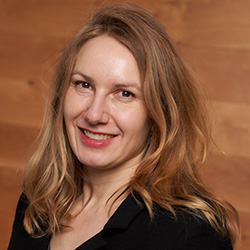Examining Fairness, Accountability, and Transparency in Socio-Technical Systems
The flagship venue for cross-disciplinary examination of the social, moral, and legal implications of socio-technical systems, the 2023 ACM Conference on Fairness, Accountability, and Transparency (ACM FAccT) draws computer scientists, educators, journalists, lawyers, philosophers, policy experts, and other practitioners concerned about the ever-expanding applications of artificial intelligence and machine learning technologies in socially consequential domains. The event will be held June 12-15 at the Hyatt Regency McCormick Place in Chicago.

Hullman is Ginni Rometty Professor and associate professor of computer science at the McCormick School of Engineering.
Recursion is a collaboration with Andrew Gelman, professor of statistics and political science at Columbia University. The performance is directed by Juan Barrera Lopez, second-year student in Northwestern’s School of Communication, and will be performed by a troupe of Northwestern students, including Sophie David, Theo Gyra, Baz Holifield, Sydney MacGilvray, Esteban Ortiz-Villacorta, Brennan Pringle, and Maelea Tan. Northwestern Engineering’s Office of the Dean provided funding support for the performance.
Recursion is a science-fiction story featuring characters based in part on real people. The team — a founding father of artificial intelligence, a pioneer in software engineering, a hacker, and an experimental poet — is summoned by the US Navy to investigate a mysterious signal interfering with submarine tracking systems.
“They make a lot of mistakes,” Hullman said. “One of our goals was to make the story and dialogue feel like doing science. They’re trying to solve this problem together and, along the way, there are personality conflicts and tensions. Many of these are reminiscent of the concerns people are still grappling with these days in computer science, such as lack of diversity, software ownership, privacy and surveillance, and questions around the ethics and accountability of artificial intelligence, such as ‘who is responsible when something bad happens’ and ‘do we need to constrain technological progress?’”
Gelman shared the first draft of the play with Hullman, who has some prior experience in the arts, in early 2021. The two – regular research collaborators – spent the next 18 months iterating the script. After collecting feedback, they staged a small, private debut of Recursion for family and friends last June at Columbia University which helped them further refine the script.
“We hope that, through the play, more people will be inspired to bring together engineering and art,” Hullman said. “There is a need to discuss topics that can sometimes be hard to bring up frankly in a CS department. Through this experience, I learned the value of using the arts to explore these topics in a different way.”
Hullman’s research addresses challenges and limitations that arise when people draw inductive inferences from data. Her work has contributed multiple visualization and interaction techniques for improving reasoning under uncertainty from data-driven interfaces, as well as theoretical frameworks for understanding the role of visualization in statistical workflow.
As an ACM FAccT program co-chair, Hullman is responsible for overseeing the paper review and acceptance process and the program agenda development. Fellow co-chairs include Lilian Edwards, professor of law, innovation and society at Newcastle University; Atoosa Kasirzadeh, assistant professor of philosophy at the University of Edinburgh, director of research at the Futures Institute Centre for Technomoral Futures, and research lead at the Alan Turing Institute; and Berk Ustun, assistant professor of computer science and engineering at the University of California, San Diego.
“It’s a young, interdisciplinary community and there’s a lot of important work that comes out of it,” Hullman said. “It’s been interesting to see what people are working on and to see some of the latest points of discussion around what forms of fairness are possible and desirable for algorithms.”
Northwestern members of the ACM FAccT program committee also include:
- Nicholas Diakopoulos, associate professor of communication studies in Northwestern’s School of Communication and (by courtesy) of computer science in Northwestern Engineering. Diakopoulos is also a member of the Center for Advancing Safety of Machine Intelligence (CASMI) governance advisory committee.
- Hyeok Kim, a PhD candidate in computer science at Northwestern Engineering, advised by Hullman
- Priyanka Nanayakkara, a PhD candidate in the joint Technology and Social Behavior program, also advised by Hullman
Additional contributions to the ACM FAccT program from CASMI-affiliated researchers include:
- “A Systematic Review of Ethics Disclosures in Predictive Mental Health Research” and “The Dimensions of Data Labor: A Road Map for Researchers, Activists, and Policymakers to Empower Data Producers” — Stevie Chancellor (University of Minnesota)
- "User Engagement in Algorithm Testing and Auditing: Exploring Opportunities and Tensions between Practitioners and End Users" — Ken Holstein (Carnegie Mellon University), Diakopoulos, and Christo Wilson (Northeastern University)
- “Ground(less) Truth: A Causal Framework for Proxy Labels in Human-Algorithm Decision-Making, “Counterfactual Prediction Under Outcome Measurement Error,” and “Uncovering the Practices and Opportunities for Cross-functional Collaboration around AI Fairness in Industry Practice” — Holstein
- “An Empirical Analysis of Racial Categories in the Algorithmic Fairness Literature” — Abigail Jacobs (University of Michigan)
- “The Possibility of Fairness: Revisiting the Impossibility Theorem in Practice” — Julia Stoyanovich (New York University)
- “Exploring the Feasibility of Crowdsourcing to Identify Political Content on Social Media” — Jacob Thebault-Spieker (University of Wisconsin-Madison)
